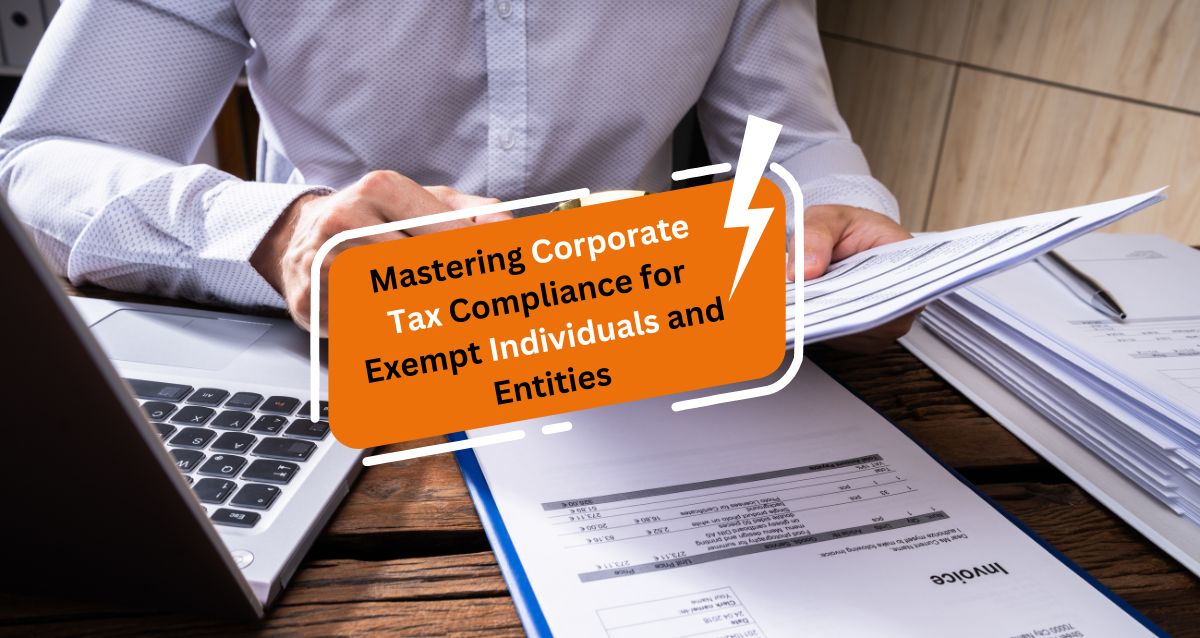Mastering Corporate Tax Compliance for Exempt Individuals and Entities
The United Arab Emirates (UAE) is famous as the tax and business-friendly country in the world. The country’s governments provide numerous tax benefits and other benefits for people who kick-start their business in this country.
Despite being tax-friendly, the nation has introduced the corporate tax for the people running their businesses. The introduction of the UAE corporate tax (CT) in June 2023 brought a new layer of complexity to the financial environment in this country. While most businesses in the UAE understand their tax obligation, numerous confusions exist around the applicability of corporate tax to the exempt person.
If you are also facing several confusions about the corporate tax for exempt persons, you should invest some time with us. We will highlight the nuance of Tax filing obligations and other regulations, focusing on accountability under corporate tax and the significance of Corporate tax record-keeping in the UAE.

Who is an Exempt Person Within the Corporate Tax Law in the UAE?
There are numerous people in the United Arab Emirates who are exempted from the UAE tax laws. The following is the list of exempt persons under the UAE corporate tax law:
- Any entity of the government
- Any person who deals in any extractive company who meets the criteria or rules under Article 7 of the corporate tax law in the United Arab Emirates
- Any entity controlled by the government
- Any public pension, any social security funds, or any private pension that would be subject to the legal oversight of the relevant authorities in the state and complies with all conditions or regulations laid by the minister
- Any person engages in any non-extractive natural resource corporation that meets the conditions of Article 8 of Corporate Tax law in the UAE.
- Any qualifying public advantage entity defined within Article 9 of CT or corporate tax law
- Any qualifying funds of investment defined within Article 10 of the CT or corporate tax law
- Any individual exempted under a cabinet decision upon the minister’s recommendation.
- Any juridical person who is incorporated within the state. In addition, the same person who is completely owned and controlled by any exempt person as mentioned in the above 1, 3, 4, and 7 points and who is engaged in any of the following activities:
- Any activities performed should be ancillary to those conducted by the exempted person.
- Undertaking any activity that is partially or wholly exempted
- Who is engaged in having the assets or making the investment in the funds exclusively for the benefit of any exempted person
Suppose any of the exempt persons come under complying with the rules and regulations of the Corporate Tax (CT) laws. In that case, the exempt status of those persons might be revoked under the law.

Understanding the Conditions for Exemption
Each category of exemptions comes with its own set of rules and conditions. It is essential to deeply understand these requirements to ensure your eligibility and Corporate tax compliance. The information about these requirements is available on the official website of the Federal Tax Authority (FTA) website. However, you can also consult a tax consultant, like Flyingcolour Tax Consultant, to understand the conditions for exemptions.
What Are the Obligations For Registration of the Exempted Persons Under the CT law?
Most exempted persons are not subjected to registering themselve under the UAE tax laws. According to the UAE tax laws, the following is the list of persons who must not register under the CT laws with the respective authority:
- Any entity of government or any person who occupies any non-extractive natural resource corporation that meets the conditions of Article 8 of CT or corporate tax law will be subject to getting registered under the CT law without any bias if these persons become taxable within the provisions of the law.
- Any person who occupies any non-extractive natural resource company that meets the conditions of Article 8 of CT law
- Any non-resident person who makes state-sourced income as defined within Article 13 of Corporate Tax or CT law and who does not have any permanent establishment (PE) in the state as per the provisions under CT law.
- Any entity of government
- Any UAE government-controlled entity
- Any individual who manages any extractive company who meets the criteria under Article 7 of the CT law
The entities or persons who do not fall under the criteria that we have mentioned above will be subject to corporate tax registration.

What are the obligations for registration of the exempted persons under CT law?
According to the Corporate Tax (CT) laws, the exempt person and taxable person must maintain all the required documents and other similar records for a period of seven years from the tax period conclusion’ to which they relate.
The primary point to note is that the record with the necessary documents must be kept for seven years from the end of tax periods from which the taxpayers and exempt persons can relate. Remember, they should not maintain these records from the years they were created.
Example
If any taxable person uses a cash basis for the methods of accounting, it might have bills or receipts that may be raised in a tax period before that tax period which they have paid. In these cases, seven-year criteria will be met when the year begins from the tax period in which the bills and invoices were paid.
The records and relevant documents maintained by the exempt persons must be given before the Federal Tax Authority (FTA) when requested by them. Remember, the record and documents must be updated and contain all the necessary information the FTA wants. Hence, you must ensure that all required information is easily accessible by the Federal Tax Authority (FTA).
How Can Flyingcolour Tax Consultant Help You?
Navigating through the complex landscape of the UAE corporate tax exemptions might be difficult for businesses in the United Arab Emirates. Flyingcolour Tax Consultant can help you understand each aspect of the exemptions of Corporate tax in this country. In addition, we will help you to fill and register corporate tax returns in this country.
To learn more about Registration Rules for Exempt Persons Under Corporate Tax, book a free consultation with one of the Flyingcolour team advisors.
Disclaimer: The information provided in this blog is based on our understanding of current tax laws and regulations. It is intended for general informational purposes only and does not constitute professional tax advice, consultation, or representation. The author and publisher are not responsible for any errors or omissions, or for any actions taken based on the information contained in this blog.
